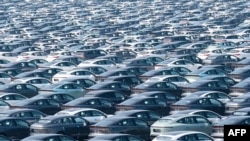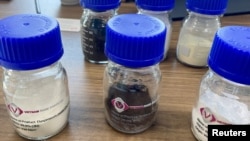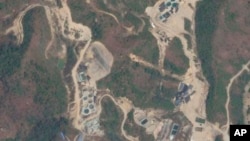China is seizing control of critical minerals including rare earth that go into the making of electric vehicles (EVs), its batteries and a range of electronic products for civilian and military uses, according to analysts. Chinese companies in recent months have stepped up efforts to procure the minerals from diverse places like Myanmar, Vietnam, Morocco and Congo, according to several reports.
China’s quest for a larger share of critical minerals is significant because it is expected to use them as retaliatory tools against the U.S. if Washington decides to dramatically increase tariffs on Chinese goods, as President-elect Donald Trump has said he would do, according to analysts who spoke to VOA.
“Rare earths are a powerful tool China will use to retaliate against the Trump administration if the tariff war escalates,” Zhiqun Zhu, political scientist at Bucknell University in Pennsylvania, told VOA in an emailed interview.
The Chinese Ministry of Commerce recently announced tighter control over exporting several rare earth minerals to the U.S.
In early December, China banned exports to the United States of the critical minerals gallium, germanium and antimony, which have widespread military applications, expanding curbs Beijing began rolling out in 2023.
“This is just the first step and a warning to the incoming administration in Washington. However, the doors are still open for negotiation to avoid a heightened tariff war,” Zhu said.
Beatrix Keim, director of Germany-based Center Automotive Research, said, “China controls the vast majority of refining capacity for rare earth and lithium, which is used for making batteries. China needs these minerals to feed its expanding new energy vehicle (NEV) sector.”
“At the same time, China is investing in relationships with several countries that supply these resources,” she added.
China has 36% of the world’s rare earth reserves but controls 70% of the global supply from mines in different countries, according to Now-Gmbh, a government-run research organization in Germany. China also controls 77% of the refining capacity for rare earth, it said.
“Some of the other sources of rare earth [minerals] like Vietnam, Russia and Brazil could be considered allies of China,” Lourdes Casanova, director of Cornell University’s Emerging Markets Institute, told VOA in an email.
The U.S. has significant rare earth resources at 1.8 million tons, according to U.S. Geological Survey estimates, besides being able to source from India and Australia, which have considerably higher resources.
Chinese companies also control most of the mines producing cobalt, a crucial component of electric vehicle batteries and other electronics, in the Democratic Republic of Congo, according to the London-based minerals research and pricing firm Benchmark Mineral Intelligence. Congo accounts for 70% of the global supply of cobalt, according to International Shareholder Services (ISS) based in the U.S. state of Maryland.
Myanmar tussle
China is taking advantage of the clashes between the military junta and rebel groups in Myanmar to extend its influence in the rare earth mining areas of the country. Myanmar produces several types of rare earth minerals, including heavy rare earth elements, which are critical in so-called “clean energy” technologies.
The rebel group Kachin Independence Army (KIA) has taken control of the Myanmar town of Kanpaikti, on the country's border with China. Kanpaikti has rich sources of rare earth minerals. This means that China could potentially be the sole buyer, purchasing the minerals from rebel groups instead of the ruling military junta, Sreeparna Banerjee, an associate fellow at New Delhi’s Observer Research Foundation, told VOA. Chinese officials have been engaged in negotiations with rebel groups for a long time, she said.
“China stands to maintain its supply dominance by negotiating directly with the new power holders ... the Kachin Independence Army (KIA),” said Banerjee. “This could potentially provide China with more favorable terms, as the KIA may prioritize securing revenue from a reliable buyer.”
On the other hand, the ongoing conflict between the rebels and the military junta has resulted in disruption of supplies and a sharp rise in the prices of some rare earth materials, like dysprosium and terbium, Banerjee said.
Bucknell’s Zhu said, “It is not surprising that China has reached out to the rebels regarding continued mining and China's undisrupted purchase of rare earths from Myanmar.”
Xi’s Morocco visit
Chinese President Xi Jinping visited Morocco last month amid increasing investments by Chinese companies for manufacturing batteries used in electric vehicles. China’s Gotion High-Tech has committed $1.3 billion to build Africa’s first EV battery “gigafactory” near Rabat, while two other Chinese companies are making battery components.
“I think China is planning to manufacture cars in Morocco that could be sold in Europe, which is a short distance away,” said Keim, of Center Automotive Research. “That way, Chinese companies can evade high tariff rates in European countries.”
In October, the European Union imposed heavy tariffs ranging from 17% to 35.3% for various types of China-made EVs. The EU justified the decision saying China subsidized its EV makers, allowing them to sell at extremely low prices in Europe. China has challenged the decision at the World Trade Organization, resulting in heightened trade tensions between Beijing and the EU.
“European EV makers are unable to compete with Chinese firms,” said Casanova, of Cornell University. “The EU wants to protect its own companies, like the German Volkswagen, Mercedes, BMW, the French Renault or the Italian Stellantis [formerly Fiat].”






